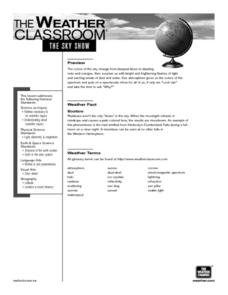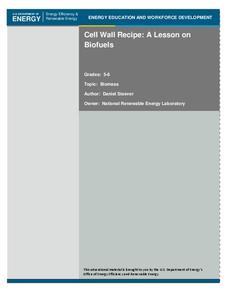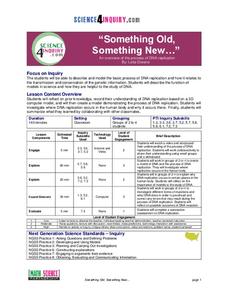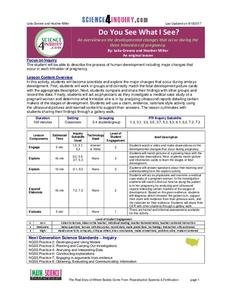Curated OER
Sky Show
Students participate in a discussion of the sky and colors. They watch a demonstration of how colors can change. They examine the issue of if weather should be a part of their coursework.
Curated OER
Changing Planet: Permafrost Gas Leak
Pair earth scientists up to use an amazing online arctic portal mapping tool and Google Earth to analyze permafrost changes. They compare changes to data on atmospheric concentrations of methane to see if there is a correlation. Then...
Curated OER
Cell Wall Recipe: A Lesson on Biofuels
Biotech engineers discover that changes in the DNA code for cell wall formation can help create crops better suited for biofuel production. They extract DNA from wheat germ. They decode paper strips with codes and relate the activity to...
Science 4 Inquiry
"Something Old, Something New..."
Young scientists learn about DNA replication through a video and model creation. They answer analysis questions before exploring the role of mutations and then complete a summative assessment.
Science 4 Inquiry
Let's Get Moving
Rivers top the list of causes of erosion over time. Scholars experiment with wind, water, and ice reshaping sand. They connect the simulations facts about erosion and deposition to understand unique landforms such as the Grand Canyon and...
Science 4 Inquiry
Phases of the Moon
The moon takes just over 27 days to orbit around Earth. Young scientists position themselves as the earth as they rotate around the sun and hold the moon. This allows them to observe the patterns and phases of the moon.
Science 4 Inquiry
Temperature of Inner Planets
Mars, Earth, and Venus contain atmospheres that generate weather. Young scientists explore the temperature of inner planets. They create a model simulating the greenhouse effect before researching and answering guided questions to...
Science 4 Inquiry
Frenemies, Bros and Killers: A Lesson in Symbiosis
Animals and plants develop relationships and rely on each other to survive. Pupils learn more about symbiosis through a video, a hands-on matching activity, and a game. They differentiate and describe each type on a written evaluation.
Science 4 Inquiry
Plant Structures Lab Stations
In China, hibiscus is known as the shoe flower because it is used to polish shoes, while in Hawaii, it is honored as the state flower. Young scientists learn about the structure and function of flowers. They dissect hibiscus flowers,...
Science 4 Inquiry
Maintaining Mass
Can you disprove the law of conservation of mass? Pupils observe the teacher weigh each part of a reaction. Then, the teacher weighs the result of the reaction and everyone sees that the products do not equal the reactants. Then they...
Curated OER
Designing Experiments - Overview
Students explore the concepts that enable them to design and conduct sound scientific experiments. They critique a faulty experiment and become familiar with some of the criteria of a good experiment. They conduct their own experiment.
Curated OER
Ocean Careers Exploration
Learners will work together in groups to gather information about careers in oceanography. They discover the need to have a diverse group of people on a team and then share their information with the class. Web links and materials are...
Curated OER
What are Igneous Rocks and How are They Formed?
Crystals form before your very eyes! What sixth grader wouldn't enjoy this lesson plan on igneous rock formation? Using hot Salol, junior geologists observe the crystal formation process as the material cools. This comprehensive lesson...
PHET
Planet Designer: What’s Trending Hot?
Excite scholars to design their own planet in this first of five lessons. The instructional activity starts with a pre-activity assessment, a complete lesson plan that is easy to implement, and a post-activity assessment that would look...
PHET
Planet Designer: Retro Planet Red
What does the atmosphere on Mars look like? This fourth lesson in the series of five is designed for high schoolers. Scholars apply previous knowledge to add atmosphere to Mars in an online simulation. This comprehensive lesson includes...
Curated OER
Designing a Real Life Ecosystem!
Students research abiotic and biotic factors concerning the concept of an ecosystem. Record and analyze data collected. Write a lab report in proper and scientific format with thinking and analytical skills. Work as a cooperative team.
PHET
Planet Designer: Martian Makeover
Mars used to have liquid water, can you make it come back? Use the lesson and simulation to understand why Mars lost its magnetic field, why atmosphere is important, and what gravity has to do with it. This is the third lesson in a...
Curated OER
Close Encounters
Young scholars investigate the cause of death of a fictitious school janitor. They develop hypotheses based on information discovered by examining the labels of household chemicals.
Curated OER
Our Solar System and Seasons
Sixth graders investigate the relative diameters of planets and distances between them and the cause for seasons on Earth using the 5-E Learning Model. They appreciate the size and distances involved with objects in the real universe....
Curated OER
An Introduction to the Night Sky and Movement Astronomy
Basically, this is an interactive exploration of educational astronomy software and an app. Young astronomers discover how the apparent motion of the sky relates to Earth's movements and the position of the observer. It is out of this...
Science 4 Inquiry
It's Not All Visible
Electromagnetic waves travel though empty space, something no other wave type can accomplish. Young scientists learn more about the entire spectrum of electromagnetic waves. They sort cards and apply their knowledge to create models of...
Science 4 Inquiry
Bubbles and Colors and Smells...Oh My!
A demonstration of elephant toothpaste hooks pupils' interest as they complete multiple experiments with colors, smells, bubbles, and more. By the end, they understand the differences between physical and chemical changes in the world...
Science 4 Inquiry
Do You See What I See?
In only nine months, a small group of cells grows into a fully developed baby. Pupils learn about the development of an embryo to a fetus to a baby. They identify each step of weekly development. Young scientists look at ultrasounds to...
Science 4 Inquiry
Genetics, Genetics, and More Genetics: Exploring Independent Assortment and Non-Mendelian Genetics
Two individuals share 99.9 percent of their genetic codes, yet diversity is observed everywhere. Young scientists learn about diversity through hands-on activities and an experiment. They apply the concepts of independent assortment and...
Other popular searches
- Life Science Inquiry
- Earth Science Inquiry
- Science Inquiry
- Science Inquiry Lessons
- Inquiry Based Science Lessons
- Inquiry Based Science Lesson
- Earth Science Inquiry Rocks
- Nature of Science Inquiry
- Earth Science Inquiry Water
- Life Science Inquiry Fossils
- Earth Science Inquiry Maps
- Life Science Inquiry Frogs

























